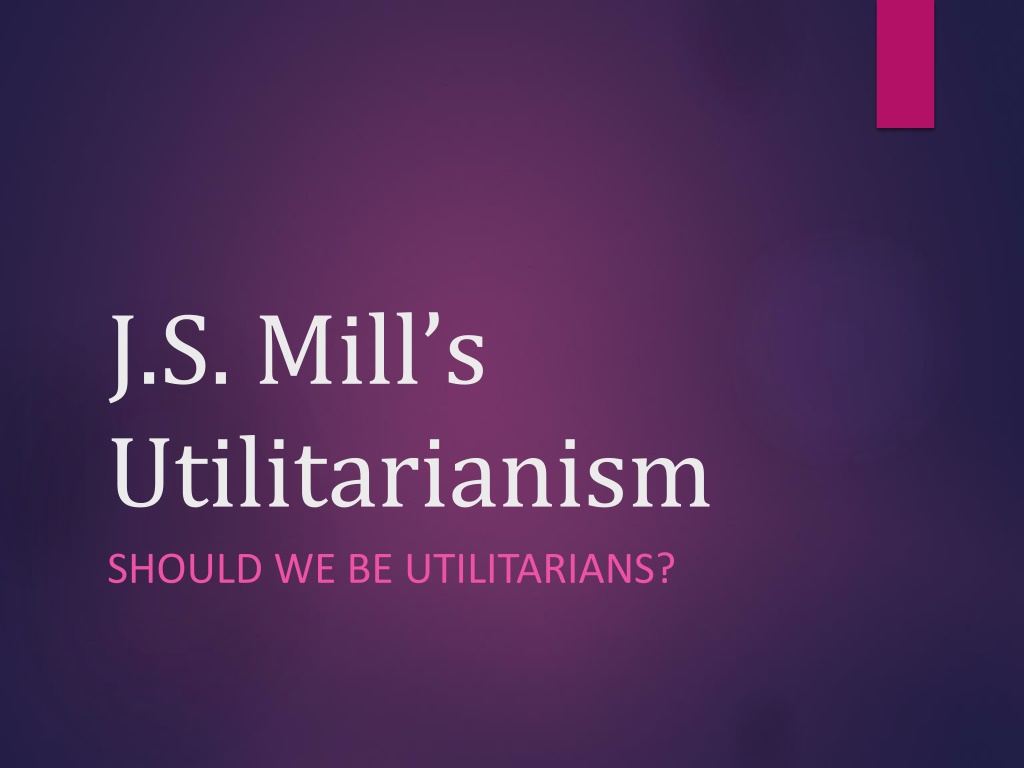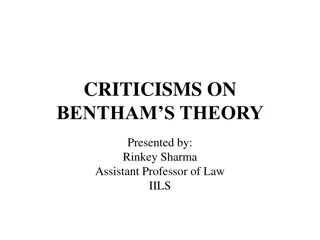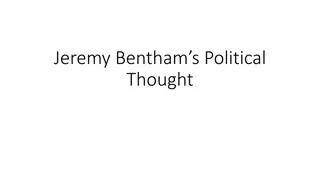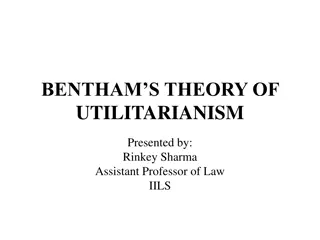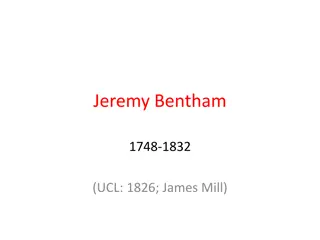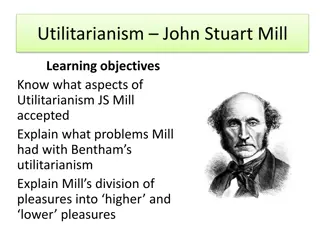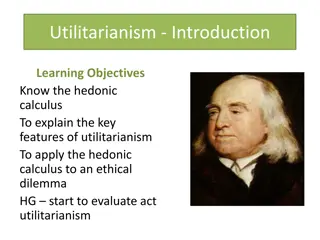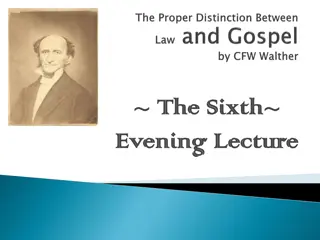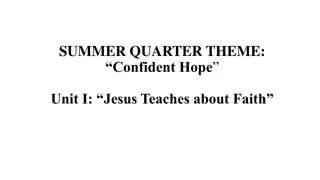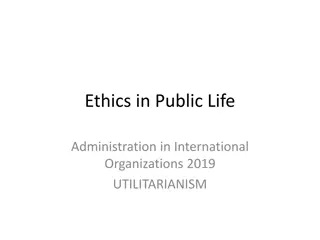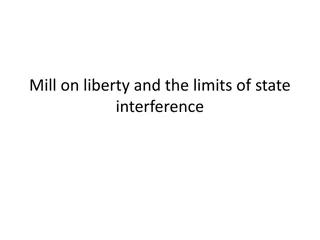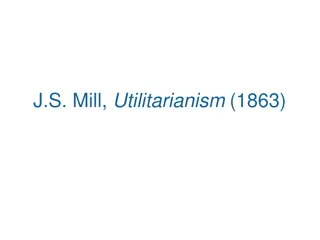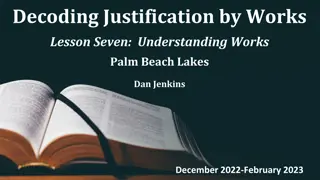Understanding J.S. Mill's Justification of Utilitarianism
J.S. Mill's Utilitarianism posits that actions are morally right if they promote happiness and wrong if they lead to unhappiness. Mill's proof of the principle of utility is based on empiricism and the desire for happiness as a desirable end. He argues that happiness is inherently desirable based on the fact that individuals seek their own happiness. This justification forms the foundation of utilitarian ethics, showcasing how happiness serves as a key criterion for moral judgment.
Download Presentation

Please find below an Image/Link to download the presentation.
The content on the website is provided AS IS for your information and personal use only. It may not be sold, licensed, or shared on other websites without obtaining consent from the author. Download presentation by click this link. If you encounter any issues during the download, it is possible that the publisher has removed the file from their server.
E N D
Presentation Transcript
J.S. Mills Utilitarianism SHOULD WE BE UTILITARIANS?
This lecture Mill Chapter 4 How might utilitarianism be justified? Mill s proof Criticisms of Mill s argument Replies
Mills Utilitarianism Actions are right in proportion as they tend to promote happiness, wrong as they tend to produce the reverse of happiness But what positive argument can be given for utilitarianism? How does he prove principle of utility/greatest happiness principle? Empiricism: observation and experience
Aim of Mills proof Not a deductive proof: Questions of ultimate ends are not amenable to direct proof. Whatever can be proved to be good, must be so by being shown to be a means to something admitted to be good without proof (Ch. 1) Evidential proof (2 steps): 1. Happiness is desirable: That happiness is desired as an end is evidence of it being good (including general happiness) 2. Nothing else is desirable: There is no evidence that anything else is desired as an end independently of happiness
Mills proof: visible and desirable The only proof capable of being given that an object is visible, is that people actually see it. The only proof that a sound is audible is that people hear it: and so of the other sources of our experience. In like manner, I apprehend, the sole evidence it is possible to produce that anything is desirable, is that people actually desire it ...
Mills proof: visible and desirable ... No reason can be given why the general happiness is desirable, except that each person, so far as he believes it to be attainable, desires his own happiness. This, however, being a fact, we have not only all the proof which the case admits of, but all which is possible to require, that happiness is good: that each person s happiness is a good to that person, and the general happiness, therefore a good to the aggregate of all persons.
Structure of the proof: part 1. 1. Happiness is a good , which is evident from the fact that everybody desires happiness 2. Each person s happiness is a good to that person 3. The general happiness is thus a good to the aggregate of all persons 4. Preliminary conclusion from 1-3: happiness is ... one of the criteria of morality
Structure of the proof: part 2. Final step: happiness is the only good there is in reality nothing desired except happiness. Whatever is desired otherwise than as a means to some end beyond itself, and ultimately to happiness, is desired as itself a part of happiness, and is not desired for itself until it has become so (Ch. 4) Only happiness is desirable in itself (has intrinsic value), which is evidenced by the fact that only happiness is desired for itself
Mills conclusion happiness is the sole end of human action, and the promotion of it the test by which to judge all human conduct; from whence it necessarily follows that it must be the criterion of morality We might accept that happiness is desirable but is it really the only thing which is desirable?
Controversial steps Even if it were true that people desire their happiness, it does not follow that happiness is desirable (equivocation of desired empirical fact - and desirable normative judgment; Naturalistic fallacy) Even if it were true that each person s happiness is a good to that person , it does not follow that the general happiness is desirable (fallacy of composition) Implicit consequentialist premise
Naturalistic Fallacy Mill has made as naive and artless a use of the naturalistic fallacy as anybody could desire. Good , he tells us, means desirable , and you can only find out what is desirable by seeking to find out what is actually desired ... The important step for Ethics is this one just taken, the step which pretends to prove that good means desired . Well, the fallacy in this step is so obvious, that it is quite wonderful how Mill failed to see it. The fact is that desirable does not mean able to be desired as visible means able to be seen . The desirable means simply what ought to be desired or deserves to be desired; just as the detestable means not what can be but what ought to be detested and the damnable what deserves to be damned (Moore 1903: 66-7)
Naturalistic fallacy Mill defines good as desired Moore trying to define good is like trying to define yellow Fails the Open question test: Is everything desirable good? (cf. Is an unmarried man a bachelor?) Is good a non-natural property?
Response to naturalistic fallacy? Mill doesn t say that happiness is desirable (a good) because it is desired Only postulates that the evidence for whether or not something is a good is that it is desired
Fallacy of composition What is the fallacy? Ascribing property of members to the set (e.g. Each coin is worth 1p, therefore the pile is worth 1p) Applied to Mill: Does it follow from a person s happiness being a good to that person , that the general happiness is desirable? Rational for you to pursue your happiness, but why does it make it rational to pursue maximisation of happiness for all?
Mills response when I said the general happiness is a good to the aggregate of all persons I did not mean that every human being s happiness is a good to every other human being, though I think in a good state of society and education it would be so. I merely meant ... To argue that since A s happiness is a good, B s a good, C s a good, etc., the sum of all these goods must be good
Rationality of general happiness? Plausible to accept that good is additive (that A s good, plus B s good is a larger amount of good that just A s alone) But why should A have as their aim the general happiness? What is desirable for the set is not necessarily desirable for the individual (since what is best for the group might not be best for the individual) Mill needs an argument for impartiality (why should other s happiness matter to you?) distinction between persons is irrelevant
Moral point of view and the impartiality of concern: Bentham's dictum everybody to count for one, nobody for more than one, might be written under the principle of utility as an explanatory commentary. The equal claim of everybody to happiness in the estimation of the moralist and the legislator involves an equal claim to all the means of happiness
Implicit consequentialist premise Consequentialism: Morality is concerned with the promotion of the good What is right is what brings about the best consequences
Alternative arguments for Utilitarianism Intuitive appeal Impartiality and equality Justifies conventional morality Is action-guiding Flexibility
For next week ... Is Utilitarianism compatible with the notion of justice? What sorts of recommendations does the greatest happiness principle make? Try to think about some particular examples ... Does Utilitarianism produce any counter- intuitive results?
